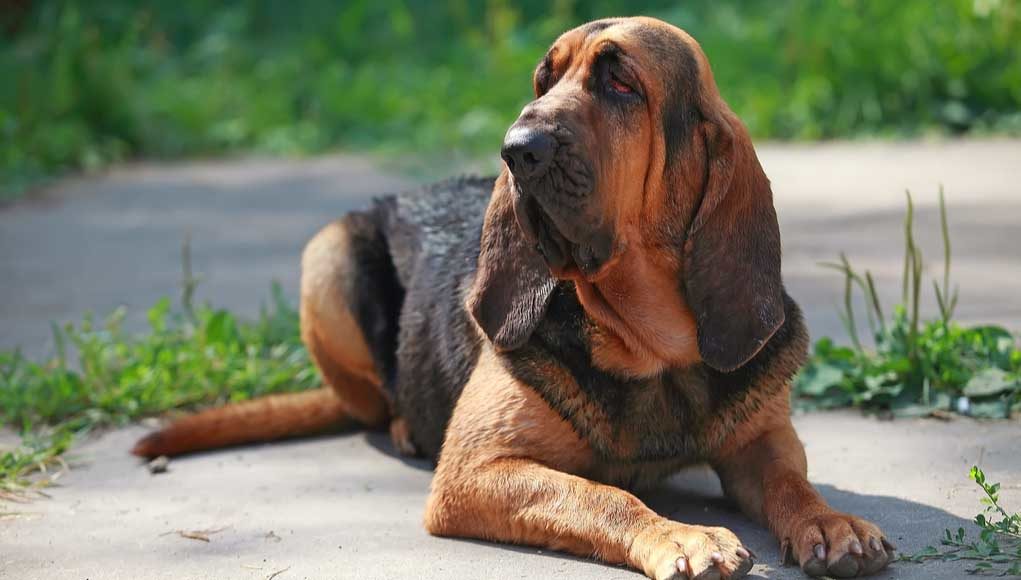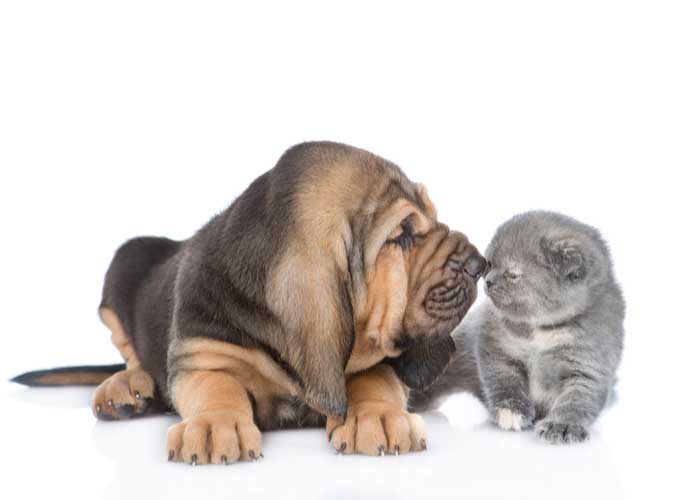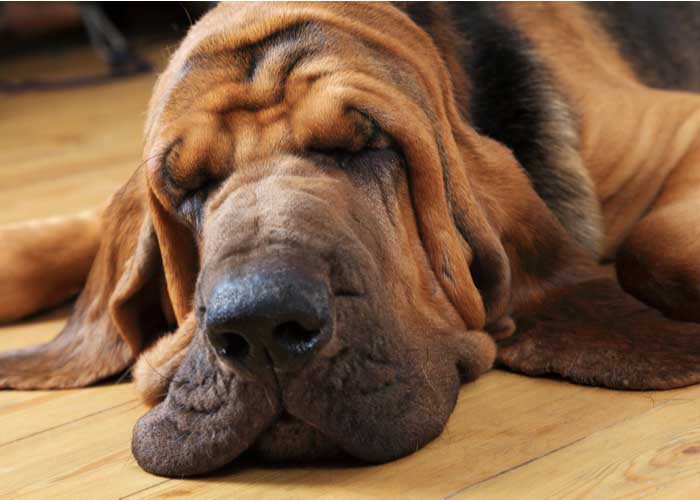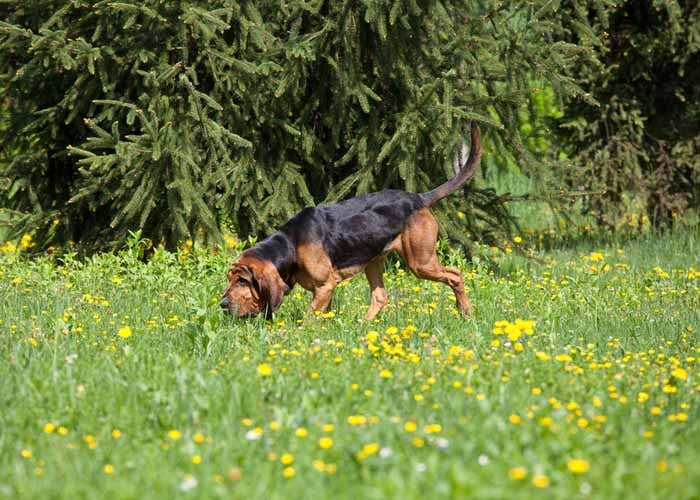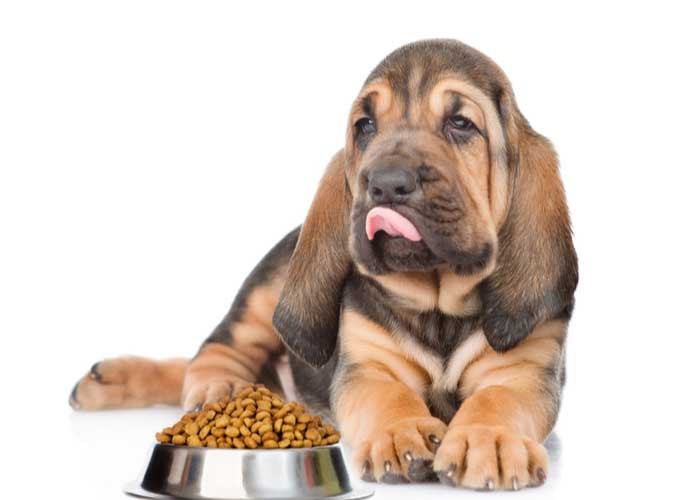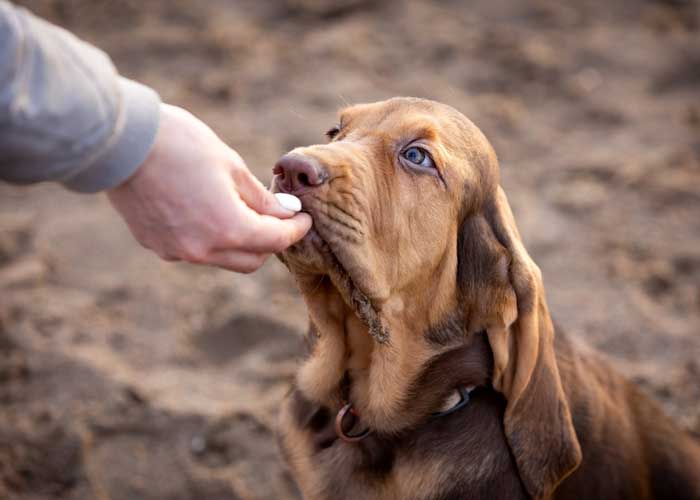Table of Contents
As the oldest breed of hounds that hunt by smell, American Bloodhounds can follow a scent for miles. They are exceptionally skilled trackers, whether it be wildlife or a person.
Research shows that a Bloodhound dog’s sense of smell is at least 1,000 times stronger than a human's, making the Bloodhound breed good detectives.
A Bloodhound is tenacious when following a trail. When looking for people, this hound dog’s ability is so accurate that its findings are acceptable in a court of law.
Because of this hound dog breed’s unmatched sense of smell, they act as police dogs, helping law enforcement find criminals.
This concentrated and lively type of hounds makes perfect search and rescue dogs, and won't rest until they have reached the end of their trail.
Are you a fur parent who is fond of a large canine? Then you might want to consider getting a Bloodhound puppy.
American Bloodhounds: Overview
With their families, these dogs are affectionate and gentle. Despite their great size and strength, these hound dogs have easygoing personalities with their owners.
Bloodhounds enjoy company, including other dogs and kids. Their friendliness goes for both children and other pets.
They proved themselves useful to locate lost persons and criminals alike but were never inclined to attack. Their docile character makes them nonthreatening to humans.
The American Bloodhounds have a nature of stubbornness and sensitivity. It needs an owner who is patient, loving, and persistent.
When he feels mistreated, a bloodhound will sulk and hide. He is attentive to kindness or correction but still wants to do things his way.
American Bloodhounds Standard
Bloodhounds' Height and Weight
Bloodhounds are large dogs standing 23 to 27 inches and weighing up to 110 pounds.
Bloodhound Dog Coat
The coat is short but smooth and can be black and tan, liver and tan, or red.
Hound Dog Feature
They are famous for their long, wrinkled face with loose skin, and huge, floppy ears. Not to mention their incredibly powerful nose.
Hound Dog Breed Traits
They tend to chew anything and everything. It's best to keep your furniture protected or train them to stop chewing even at an early age.
The American Bloodhounds are great canine companions who you can rely on to be loyal and attentive. They are also physically active and can be good hiking companions if you are up for it.
American Bloodhounds History
As a group of dog breeds that hunt by scent, Bloodhounds’ ancestors were in medieval France to trail deer and boar.
Originated in Europe, this hound dog breed was called St. Hubert Hounds before they were known as Bloodhounds.
These scent hounds were brought to England where they were developed and eventually made their way to America in colonial times.
In the 12th century, these dogs were highly bred that they came to be known as “blooded hounds,” referring not to what they trail but as aristocratic.
They were prized not only for their skills in the hunt but also for their ability to track down wrongdoers. By the 16th century, they were used to track people, particularly thieves.
Today, the bloodhound breed assists law enforcement. They trail men for police departments as well as search and rescue organizations.
American Bloodhounds Health
Like most purebreds, they may be prone to genetic health issues. They are also notorious for eating everything, which often leads to vet visits.
Some conditions commonly seen in Bloodhounds include:
- Ear infections: Check the Bloodhound's long, low-hanging ears daily for any sign of infection. Their ears often catch dirt, hence needing often examination and cleaning to prevent bacteria.
- Skin-fold Dermatitis: Like their ears, this breed's facial wrinkles can trap dust and moisture, hence the odor and irritation. Signs of this condition include redness commonly occurring around the face, and any fold on the body.
- Hip and Elbow Dysplasia: You may notice any signs of discomfort in a dog with this heritable condition. As dog ages, arthritis can develop. It may be hereditary but becomes worse due to environmental factors such as rapid growth from a change of diet or incurred injuries.
- Hypothyroidism: Caused by a thyroid hormone deficiency, this may lead to infertility, obesity, and lack of energy. Manage the dog’s medication throughout his life.
- Ectropion: It is the rolling out or sagging of the eyelid, leaving the eye exposed and prone to irritation and infection.
- Entropion: This deficiency causes the eyelid to roll inward, irritating or injuring the eyeball.
- Gastric Dilatation-Volvulus (GDV or Bloat): It occurs when a dog’s stomach fills with gas causing it to twist. When it happens, the dog is unable to vomit to get rid of the excess air in his stomach, blocking the blood flow to the heart. It is a life-threatening condition that can kill a dog without immediate medical attention.
How to Care for American Bloodhounds
Bloodhounds are tough but can be a family dog too. However, they require a high level of care.
Raising a dog is a responsibility, especially for this high-maintenance breed of hounds. It is not a privilege but a commitment to giving it the best life possible.
Just like owning any dog breed, you must understand the obligation of dog ownership. This includes making sure your pet stays fit as you prioritize its health.
Best to research and prepare for the proper care that the dog requires if you think the Bloodhound is right for you.
Exercise
They may be one of the calmest, most even-tempered dogs in the house, but Bloodhounds are highly active. Thus, they require plenty of daily exercises and are not suitable for small-space living.
This type of hound is tireless trailers once on the track because they pursue through any hardship.
Contrary to being lazy, Bloodhounds are working dogs. Expect to do long daily walks or runs if you live with one.
Their nose can sometimes lead them into trouble. A Bloodhound follows his nose and wanders during walks or playtime in a non-enclosed area.
Select a strong dog leash as he may not respond to commands if he has found a scent to follow.
Training
Bloodhound puppies go through training sessions for socialization and start obedience classes early. An owner needs to be firm but kind because these dogs like to take charge.
It is usually effective if the training involves positive rewards, such as treats and praise. Methods of punishment for this breed can be hurtful to their sensitive nature and lead to fear or anxiety when interacting with you.
Bloodhounds are affectionate and devoted but can be stubborn, which may make training difficult. Be consistent and patient because they do well with positive reinforcement training with special toys and treats.
You can praise the Bloodhound dog for something done well. Give gentle corrections rather than harsh punishment.
Drooling
This hound dog breed is a heavy drooler, so its facial wrinkles demand daily cleaning.
Grooming
The skin is thin hence use a medium bristle brush, a rubber grooming tool, or a hound glove to gently remove dead hair.
Aside from boosting hair growth, it also spreads skin oils throughout the coat to keep it healthy.
Bath the Bloodhound regularly to prevent odor. Brush its teeth and the nails trimmed frequently for dental hygiene and nail care.
They require consistent grooming and cleaning to prevent bacterial infections from forming because of the wrinkles around their faces, necks, and ears. Clean the folds around the mouth after every meal to avoid irritation from trapped dirt.
The Bloodhound's droopy ears often catch dirt and debris making them prone to infection, so weekly ear cleaning is mandatory. Clean them with an ear cleaning solution recommended by your veterinarian.
If you can't dedicate the necessary time to properly care for this dog, you may want to consider another breed.
Lastly, make grooming and ear cleaning a positive experience with praise and rewards.
Diet and Nutrition
Dogs are prone to getting overweight. Canine obesity can lead to serious health conditions like diabetes and heart disease.
Bloodhounds may do best with reward-based training involving food, but giving too much can cause obesity. Don’t let their big size permit them for overeating.
If your dog gained weight, limit treats and consult your veterinarian about healthy options. Monitor your dog’s calorie consumption and weight level to find out the proper portions and nutrients that your dog needs at different stages of life.
Your pet’s diet should be appropriate to his age with your veterinarian's supervision and approval. Whether commercially manufactured or home-prepared, high-quality dog food should do well for your Bloodhound.
Ideal Owners for American Bloodhounds
The Bloodhound is a popular breed. Therefore, they are easy to get but not that easy to keep.
Because of their sensitivity, the perfect owner must be patient because punishment affects them emotionally.
Bloodhounds don’t like noisy households nor are they the best breed for a small apartment. However, they are good for first-time owners due to their easy-going personalities.
They are one of the friendliest dog breeds. Bloodhounds enjoy being around children but can accidentally knock a toddler down due to their large size.
With this said, the American Bloodhounds are not exactly the right dog breed for families with small kids. If you can't avoid having both in the same setting, make sure to keep an eye all the time.
If you live an active lifestyle, this breed can be a good choice for you because these high-energy dogs need a lot of exercise.
They have a strong desire for exploring the world, which means that long walks make them happy.
Bloodhounds make wonderful family companions because they are genuinely loyal, gentle, and loving to their handlers. They enjoy quality time with their owners and are great emotional support dogs for elders and people in need of therapy.
If you want a quiet dog, not the best choice for you. Bloodhounds are a particularly loud breed because they enjoy barking and howling loudly.
They tend to nip and chew but have never been aggressive. Bloodhounds won’t be your best choice for a watchdog because they have a low chance of biting someone trespassing on their property.
Bloodhounds are not for every family because some would surrender them to shelters. Contact rescue groups such as the Southeast Bloodhound Rescue, Inc. to adopt a Bloodhound in need of a forever home and breed organizations where you can find additional information about this breed.
FAQs about a Bloodhound Dog
What is the personality of a Bloodhound Breed?
This type of dog is even-tempered, affectionate, and gentle but stubborn. If this kind of personality works well with you, then having an American Bloodhound puppy appears to be a good choice.
Is this breed of hound a good family dog?
It gets along well with strangers and other animals and is especially good with children. So, you can expect the American Bloodhound to be a great option for a family dog.
Why is this type of hound called a Bloodhound?
The name Bloodhound is not for being bloodthirsty, but for being a hound of pure blood or pure in breeding. Hence, there is nothing to worry about its aggression since its name only shows this certain confusion.
American Bloodhounds Summary
The Bloodhound is historically known as a hunting breed with unmatched skill in detecting human scent even after the humans are long gone.
It is a large scent hound, originally bred for hunting deer and wild boar, and since the Middle Ages for tracking people. Bloodhounds are used in police operations to track missing persons or criminals.
Identified for its long ears and wrinkled face, this hound dog has a keen sense of smell and an extraordinary ability to follow a scent — even scents that are days old. This makes the dog an important part of a search and rescue team.
There is no doubt that the bloodhound is a large dog breed. Its colors of black and tan, liver and tan, and red makes them such an approachable breed.
Bloodhounds shed moderately as a natural process of their hair growth though frequent brushing reduces the amount of hair that sheds.
This hound dog breed is prone to medical problems as well that require immediate veterinarian attention. Regular cleaning avoids infections, especially with the ears and eyes that need to be checked and well cared for.
Although affectionate and gentle, it is stubborn but will do well in training if handled patiently. The Bloodhound dog is socially interactive and desires to be with everyone around especially with the family.
This type of hound is popular and hence quite easy to get. It may be possible to find one large for you and your family through a bloodhound breed rescue group or shelter that needs a loving home.
But, is it all worth it? Of course!
No dog is perfect, but a Bloodhound is an excellent devoted breed of hounds that loves its human.
READ NEXT: 4 Most Popular Large Shorthaired Dog Breeds That Are Easy to Groom


